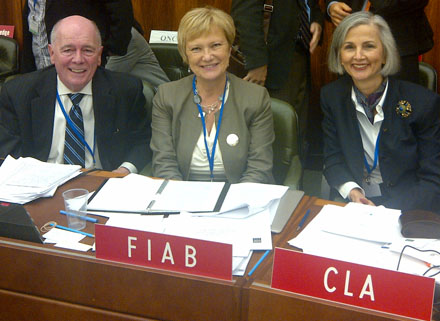IFLA advocates for an updated copyright framework
22 November 2011

Head of Delegation, Winston Tabb, IFLA President Ingrid Parent, CLM Chair Victoria Owen
On Monday, 21st November, the 23rd meeting of the World Intellectual Property Organisation (WIPO) Standing Committee on Copyright and Related Rights (SCCR) opened in Geneva. During the next two weeks, the 184 WIPO Member States discuss, among other topics, a new copyright framework for libraries and archives. The International Federation of Library Associations and Institutions (IFLA) advocates for an international legal instrument that would bring the international copyright framework for libraries into the digital age.
Summarising the first day of the meeting, it was an excellent start for libraries: the Brazilian delegation introduced a background paper written by IFLA, ICA, EIFL and INNOVARTE on the issues libraries and archives are facing. Many countries commented in support of the issue of copyright limitations and exceptions for libraries and archives. And Nigeria, noted that libraries and archives as well as other like-minded organisations are “friends of knowledge”.
IFLA is working with WIPO Member States to gain support for a binding international instrument on copyright limitations and exceptions to enable libraries to preserve their collections, support education and research, and lend materials. To demonstrate what is needed, IFLA, together with the International Council on Archives (ICA), Electronic Information for Libraries (EIFL) and Corporación Innovarte, has produced a Treaty proposal to guide WIPO’s Member States in updating limitations and exceptions for libraries worldwide.
Copyright norms grant legal protection for authors and creators to exploit their works, while providing society access to works. Legal flexibilities in copyright, known as limitations and exceptions, provide balance in a copyright system between users and creators of protected works. They enable libraries to offer access to and preservation of copyrighted works.
The SCCR meeting will take place until 02 December to address copyright limitations and exceptions for libraries and archives and the visually impaired, as well as a treaty for broadcasting and for the protection of audiovisual performances.
- More information about copyright limitations and exceptions for libraries and archives
- More information about the WIPO SCCR